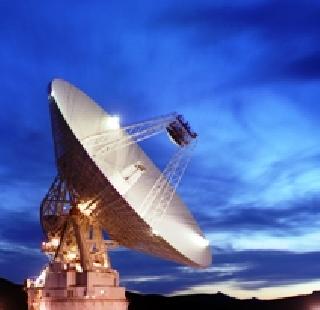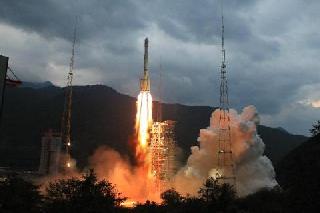
NASA's Deep Space Network (DSN). A NASA-JPL photo.
BEIJING (PTI): China is developing a deep space network with antennae and communication facilities to support its future interplanetary missions to be launched for the exploration of solar system, a top Chinese scientist has said.
China's own deep space network will take shape in the next three to five years to support its exploration projects of the solar system, said Qian Weiping, chief designer of the tracking and control system Chang'e-II lunar probe which was successfully launched on Saturday.
The deep space network consists of a network of large antennae and communication facilities that support interplanetary missions along with astronomical observations by radio and radar for the exploration of the solar system, he told state-run China Daily.
Qian said that once the network was in place, "there will be no problem for China to carry out an exploration of the solar system".
The Chang'e-II mission will test the X-spectrum telemetry, tracking and control system, a key technology in the deep space network.
"If the test succeeds, it means we have mastered the technology of using the X-spectrum to fulfil functions like orbit determination and the remote control of spacecraft in deep space," he said.
"With this technology, we only need to build larger antennae to explore planets in deep space," he said.
As part of the network, he said, two ground tracking stations with large antennae are currently under construction in the country - one in Kashgar in the Xinjiang autonomous region and the other in Jiamusi in Heilongjiang province.
Deep space usually means 1.5 million kilometers away from the Earth. As the moon is 400,000 km away from the Earth and there are no large celestial bodies between 400,000 km and 1.5 million km.
China regards the lunar mission as the starting point for its exploration of deep space, said Wu Weiren, chief designer of China's lunar exploration program.
Experts had previously said that the lack of a deep space network and a powerful launch vehicle were two factors hindering the country's exploration of deep space.
The lunar program is the technical basis for further exploration of the solar system, Wu said, adding the technology involved, such as the launch vehicle and the tracking and control systems which could be applied to exploring the planets Mars and Venus.
"So it would be possible for us to explore Mars and Venus in the foreseeable future, as the two planets are the closest to the Earth," he said.
China's space authorities have yet to announce any plan to explore the two planets.
Ye Peijian, a consultant to the chief designer of the Chang'e-II probe system, said at a forum recently that China is capable of independently exploring Mars and Venus.
Backing up his statement, he outlined a feasible route for China to explore Mars in 2013 and Venus in 2015, followed by a manned flight to the moon in 2025.
 Previous Article
Previous Article Next Article
Next Article













The Indian Air Force, in its flight trials evaluation report submitted before the Defence Ministry l..
view articleAn insight into the Medium Multi-Role Combat Aircraft competition...
view articleSky enthusiasts can now spot the International Space Station (ISS) commanded by Indian-American astr..
view article